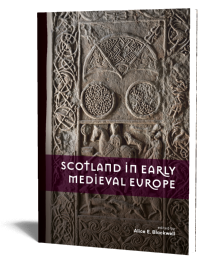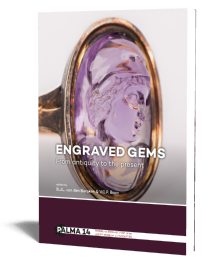Decoding the Jewels
Renaissance Jewellery in Scotland
Edited by Anna Groundwater | 2024

Decoding the Jewels
Renaissance Jewellery in Scotland
Edited by Anna Groundwater | 2024
Paperback ISBN: 9789464262575 | Hardback ISBN: 9789464262582 | Imprint: Sidestone Press | Format: 182x257mm | 200 pp. | Published with National Museums Scotland | Language: English | 3 illus. (bw) | 104 illus. (fc) | Keywords: Renaissance jewellery; Scottish goldsmithing; Scottish jewellery; Stewart royal court; Mary Queen of Scots; Scottish history; European Renaissance | download cover | DOI: 10.59641/oo901ra | CC-license: CC BY-NC-ND 4.0
Read online 652 times
- Digital & Online access
-
Buy via Sidestone (EU & UK)
-
Buy via our Distributors (WORLD)
For non-EU or UK destinations you can buy our books via our international distributors. Although prices may vary this will ensure speedy delivery and reduction in shipping costs or import tax. But you can also order with us directly via the module above.
UK international distributor
USA international distributor
-
Bookinfo
Paperback ISBN: 9789464262575 | Hardback ISBN: 9789464262582 | Imprint: Sidestone Press | Format: 182x257mm | 200 pp. | Published with National Museums Scotland | Language: English | 3 illus. (bw) | 104 illus. (fc) | Keywords: Renaissance jewellery; Scottish goldsmithing; Scottish jewellery; Stewart royal court; Mary Queen of Scots; Scottish history; European Renaissance | download cover | DOI: 10.59641/oo901ra | CC-license: CC BY-NC-ND 4.0
Read online 652 times

We will plant a tree for each order containing a paperback or hardback book via OneTreePlanted.org.
“The book is beautifully illustrated—almost excessively so … this is a brilliant addition to the literature on Renaissance jewellery, and a good demonstration of what a team of experts can create. […] It is a visually attractive book, and one that should be on every jewellery historian’s bookshelf.” – Dr Jack M. Ogden (The Journal of Gemmology 39(3), 2024)
For the first time, National Museums Scotland’s important collection of Renaissance jewellery from Scotland is considered together in this fully illustrated volume alongside significant items from the Royal Collection. The book was inspired by the acquisition by NMS of the extraordinary Fettercairn Jewel: the fine iconography of this exquisitely enamelled locket held coded messages for its sixteenth century owners, and continues to intrigue its viewers today. Renaissance jewellery like this in Scotland is particularly notable given the rare survival of such jewels from the sixteenth century. Some of these owe their survival thanks to their association with Mary, Queen of Scots.
Elite Renaissance men and women commissioned, wore and gifted intricate and valuable pieces of jewellery. For most, this was not simply adornment, but used to communicate messages and display status. These were intimate personal possessions and suggest the meanings invested in them by their owners, that resonate with audiences today. Such jewels are evocative objects.
This lavishly illustrated book brings together expert voices from the key Scottish collections (National Museums Scotland, National Galleries of Scotland, Royal Collection Trust) to explore the making, meaning and function of such jewellery in sixteenth century Scotland, and features an interpretation of the Fettercairn Jewel by the jewellery expert Geoffrey Munn. It reveals hitherto underappreciated evidence of goldsmithing in Scotland while considering significant continental influences in the design and production of jewellery. Given the ephemeral nature, and rare survival of Renaissance jewellery, its authors also suggest alternative ways of tracing the gems that have gone, in the portraits and inventories of Scottish men and women.
About the authors
Edited collection of essays by the key art historians, and curators working on Renaissance jewellery in Scotland, including Helen Wyld (Senior Curator, Historic Textiles), Lyndsay McGill (former Curator, Renaissance and Early Modern History), Anna Groundwater (Principal Curator, Renaissance and Early Modern History) and Lore Troalen (Analytical Scientist) from National Museums Scotland; and Deborah Clarke (former Senior Curator, Royal Collection Trust at the Palace of Holyroodhouse) and Kate Anderson (Senior Curator, Portraiture, at the National Galleries of Scotland). It features an interpretation of the Fettercairn Jewel by Geoffrey Munn, the jewellery specialist, historian and writer.
All have published widely on the visual and material culture of Scotland and Britain, with publications including Geoffrey Munn, Tiaras: A History of Splendour, and Artists Jewellery – Pre-Raphaelite to Arts and Crafts (with Charlotte Gere); Helen Wyld, The Art of Tapestry; Deborah Clarke, Scottish Artists 1750-1900: From Caledonia to the Continent; and Anna Groundwater, Scotland Connected: a Timeline for Scottish History. Kate Anderson is curating an exhibition on James VI and I in 2025, to commemorate the 400th anniversary of his death, and editing a related publication.
Author biographies
List of Figures and Tables
Acknowledgements
Foreword
Sam J.M.M. Alberti, Director of Collections, National Museums Scotland
1. The Renaissance in Scotland: historical and cultural contexts
Anna Groundwater, Principal Curator, Renaissance and Early Modern History, National Museums Scotland
2. The Fettercairn Jewel – An Interpretation
Geoffrey Munn, Art historian and jewellery specialist
3. The Mystery of the Fettercairn Jewel
Helen Wyld, Senior Curator of Historic Textiles, National Museums Scotland
4. ‘A Most Extraordinary and Very Curious Jewel’: the Darnley or Lennox Jewel
Deborah Clarke, former Senior Curator, Holyroodhouse Palace, Royal Collection Trust
5. Scottish Renaissance Jewels in the National Collection: making and makers
Lyndsay McGill, former Curator, Renaissance and Early Modern History, National Museums Scotland
6. Jewels in Sixteenth-Century Scottish Portraits
Kate Anderson, Senior Curator, National Galleries of Scotland
7. Tracing Royal Stewart Jewels in the Archives
Anna Groundwater
8. Analysis of the Fettercairn Jewel and other late sixteenth century Renaissance jewellery items associated with Scotland
Lore Troalen, Analytical Scientist, National Museums Scotland
Abstract:
“The book is beautifully illustrated—almost excessively so … this is a brilliant addition to the literature on Renaissance jewellery, and a good demonstration of what a team of experts can create. […] It is a visually attractive book, and one that should be on every jewellery historian’s bookshelf.” – Dr Jack M. Ogden (The Journal of Gemmology 39(3), 2024)
For the first time, National Museums Scotland’s important collection of Renaissance jewellery from Scotland is considered together in this fully illustrated volume alongside significant items from the Royal Collection. The book was inspired by the acquisition by NMS of the extraordinary Fettercairn Jewel: the fine iconography of this exquisitely enamelled locket held coded messages for its sixteenth century owners, and continues to intrigue its viewers today. Renaissance jewellery like this in Scotland is particularly notable given the rare survival of such jewels from the sixteenth century. Some of these owe their survival thanks to their association with Mary, Queen of Scots.
Elite Renaissance men and women commissioned, wore and gifted intricate and valuable pieces of jewellery. For most, this was not simply adornment, but used to communicate messages and display status. These were intimate personal possessions and suggest the meanings invested in them by their owners, that resonate with audiences today. Such jewels are evocative objects.
This lavishly illustrated book brings together expert voices from the key Scottish collections (National Museums Scotland, National Galleries of Scotland, Royal Collection Trust) to explore the making, meaning and function of such jewellery in sixteenth century Scotland, and features an interpretation of the Fettercairn Jewel by the jewellery expert Geoffrey Munn. It reveals hitherto underappreciated evidence of goldsmithing in Scotland while considering significant continental influences in the design and production of jewellery. Given the ephemeral nature, and rare survival of Renaissance jewellery, its authors also suggest alternative ways of tracing the gems that have gone, in the portraits and inventories of Scottish men and women.
About the authors
Edited collection of essays by the key art historians, and curators working on Renaissance jewellery in Scotland, including Helen Wyld (Senior Curator, Historic Textiles), Lyndsay McGill (former Curator, Renaissance and Early Modern History), Anna Groundwater (Principal Curator, Renaissance and Early Modern History) and Lore Troalen (Analytical Scientist) from National Museums Scotland; and Deborah Clarke (former Senior Curator, Royal Collection Trust at the Palace of Holyroodhouse) and Kate Anderson (Senior Curator, Portraiture, at the National Galleries of Scotland). It features an interpretation of the Fettercairn Jewel by Geoffrey Munn, the jewellery specialist, historian and writer.
All have published widely on the visual and material culture of Scotland and Britain, with publications including Geoffrey Munn, Tiaras: A History of Splendour, and Artists Jewellery – Pre-Raphaelite to Arts and Crafts (with Charlotte Gere); Helen Wyld, The Art of Tapestry; Deborah Clarke, Scottish Artists 1750-1900: From Caledonia to the Continent; and Anna Groundwater, Scotland Connected: a Timeline for Scottish History. Kate Anderson is curating an exhibition on James VI and I in 2025, to commemorate the 400th anniversary of his death, and editing a related publication.
Contents
Author biographies
List of Figures and Tables
Acknowledgements
Foreword
Sam J.M.M. Alberti, Director of Collections, National Museums Scotland
1. The Renaissance in Scotland: historical and cultural contexts
Anna Groundwater, Principal Curator, Renaissance and Early Modern History, National Museums Scotland
2. The Fettercairn Jewel – An Interpretation
Geoffrey Munn, Art historian and jewellery specialist
3. The Mystery of the Fettercairn Jewel
Helen Wyld, Senior Curator of Historic Textiles, National Museums Scotland
4. ‘A Most Extraordinary and Very Curious Jewel’: the Darnley or Lennox Jewel
Deborah Clarke, former Senior Curator, Holyroodhouse Palace, Royal Collection Trust
5. Scottish Renaissance Jewels in the National Collection: making and makers
Lyndsay McGill, former Curator, Renaissance and Early Modern History, National Museums Scotland
6. Jewels in Sixteenth-Century Scottish Portraits
Kate Anderson, Senior Curator, National Galleries of Scotland
7. Tracing Royal Stewart Jewels in the Archives
Anna Groundwater
8. Analysis of the Fettercairn Jewel and other late sixteenth century Renaissance jewellery items associated with Scotland
Lore Troalen, Analytical Scientist, National Museums Scotland
- Digital & Online access
-
Buy via Sidestone (EU & UK)
-
Buy via our Distributors (WORLD)
For non-EU or UK destinations you can buy our books via our international distributors. Although prices may vary this will ensure speedy delivery and reduction in shipping costs or import tax. But you can also order with us directly via the module above.
UK international distributor
USA international distributor
- Browse all books by subject
-
Search all books

We will plant a tree for each order containing a paperback or hardback book via OneTreePlanted.org.
You might also like:
© 2026 Sidestone Press KvK nr. 28114891 Privacy policy Sidestone Newsletter Terms and Conditions (Dutch)







